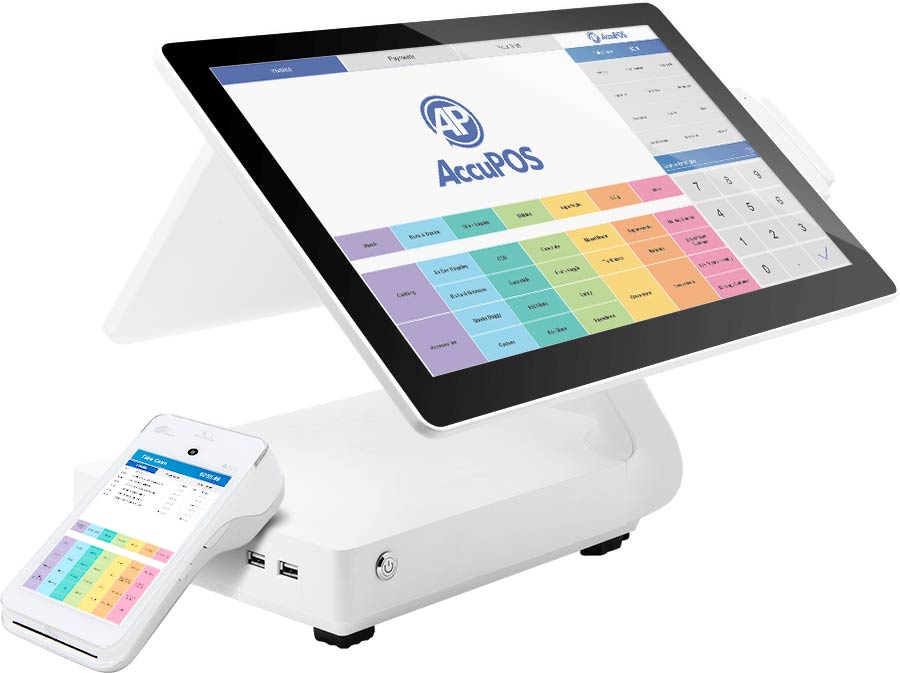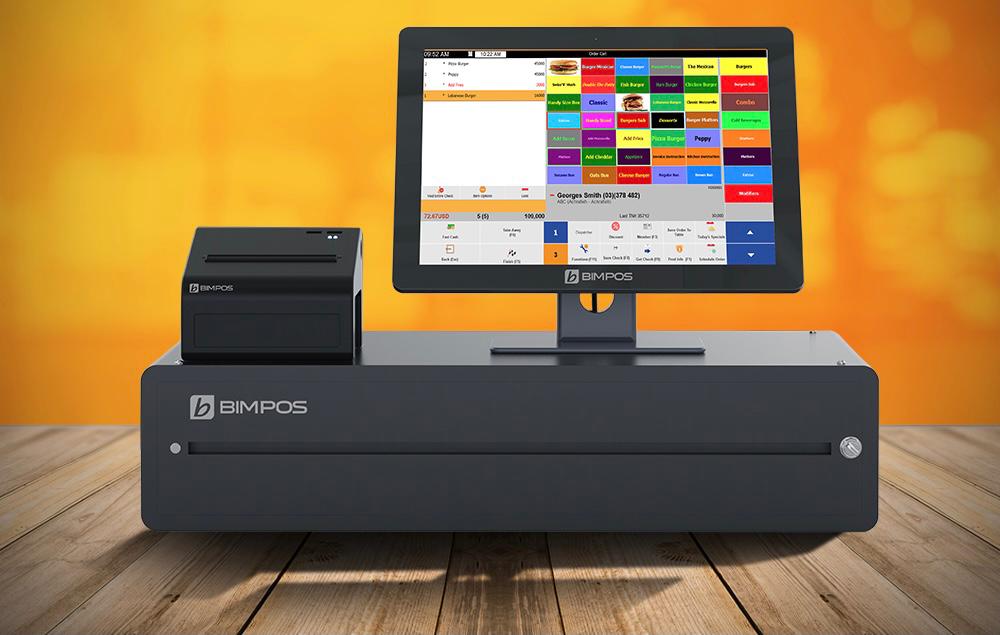Getting My Pos Systems To Work
Getting My Pos Systems To Work
Blog Article
Unknown Facts About Point Of Sale Systems

POS: Retail Point-Of-Sale Solutions Streamline Transactions
The Facts About Pos System For Small Business Uncovered

Hardware Parts of a Point of Sale System What makes a POS system tick? It's not simply software application; the hardware plays a starring role. Think of it as the body to the software's brain. Without the best hardware, even the most sophisticated POS software application is just a pretty face. Necessary POS Hardware So, what are the must-haves? Let's break it down. The main processing unit, often a computer system or tablet, is the heart of the operation. The monitor or touchscreen show enables staff to connect with the system. A barcode scanner accelerate the checkout procedure. Remember the days of by hand entering each code? The reliable invoice printer provides customers with a record of their purchase. A money drawer keeps your money safe and arranged. A card reader permits clients to pay with credit or debit cards. Diving Deeper: Beyond the Basics But wait, there's more! Depending upon your organization, you may need specialized hardware. For instance, a restaurant might incorporate cooking area printers to relay orders, while a retailer may utilize label printers for item tagging. Ever question how your regional bakery instantly prints those delicious-looking labels? Choosing the Right Hardware: A Balancing Act Choosing the right hardware isn't just about buying the most expensive devices. It has to do with finding the sweet spot between performance, durability, and budget plan. A small read more company simply beginning out may decide for a more standard setup, while a high-volume seller will need robust, high-performance makers. Is it much better to purchase brand-new or used? Consider your choices carefully. A brand-new system uses the newest technology and guarantee defense, but a refurbished system can save you cash. The Future of POS Hardware What does the future hold? Anticipate to see much more combination with mobile phones, biometric scanners for staff member authentication, and advanced analytics control panels showed on larger, clearer screens. Imagine a world where stock is instantly updated in real-time as items are scanned-- a world where you can track your very popular product from anywhere in the world. The possibilities are limitless, and the hardware is continuously evolving to meet the needs of today's organizations. Are you prepared to update your point of sale system?
Software Characteristics and Capabilities: The Heart of Your POS System
Ever see an experienced barista move through a hectic morning rush? Their trick isn't simply caffeine; it's a seamless dance with their POS system. The software application is the conductor of your business symphony, managing everything from sales to stock. However what notes should you be listening for? What abilities genuinely matter in today's market?
Stock Management: Beyond Counting Beans
Forget spreadsheets that haunt your dreams. Modern POS systems use real-time inventory tracking, signaling you when your stock of artisanal coffee beans dips precariously low. Think about it as a digital guardian angel, avoiding those uncomfortable "Sorry, we're out!" minutes to customers. What if you could likewise forecast demand based upon historic information? Numerous systems now use forecasting tools, an effective weapon versus overstocking and lost sales. This assists prevent the circumstance of running out of popular products or accumulating excess stock of slow-moving items, both of which can constrain cash flow and space.
Sales Reporting and Analytics: Translating the Data
Sales information is the new gold, and your POS system is the miner. Forget simply understanding how much you sold today. Dive deep into the data to reveal patterns, determine your best-selling products, and comprehend consumer behavior. Which menu item pairs perfectly with the daily special? Which promo resonated most with your clients? These insights are not just fascinating; they're actionable intelligence. Without reputable sales reporting, browsing the complexities of company decision-making ends up being like sailing without a compass, increasing the opportunity of errors and missed chances.
Customer Relationship Management (CRM): Building Bridges, Not Walls
Remembering a routine consumer's name and preferred order is captivating, however scaling that individual touch is difficult. POS systems with CRM capabilities permit you to track consumer purchase history, choices, and even birthdays. Picture automatically using a discount rate on their birthday-- a small gesture that cultivates commitment and motivates repeat company. There is the potential snag of poor information quality, which can lead to inaccurate customer profiles and inefficient marketing efforts.
Payment Processing: Simplifying the Transaction
The checkout experience can make or break a sale. Seamless integration with different payment methods-- credit cards, mobile wallets, even copyright-- is non-negotiable. Can your system deal with split payments? Does it offer secure tokenization to protect customer information? A cumbersome payment process resembles striking a sour note in your business symphony, possibly interfering with the whole efficiency. Guaranteeing compatibility with progressing payment innovations and adherence to security standards are vital for maintaining customer trust and functional effectiveness.
Worker Management: Keeping the Team in Sync
From clocking in and out to handling consents and tracking performance, staff member management includes simplify operations and enhance responsibility. Is scheduling a nightmare? Lots of POS systems provide incorporated scheduling tools, optimizing staffing levels based upon forecasted demand. A typical challenge that is typically neglected is the difficulty of incorporating staff member management functionalities with payroll systems, which can lead to errors and inefficiencies in wage estimations.
Advanced Features: Leveling Up Your Operations
- Table Management: Suitable for restaurants, this function permits you to visualize your dining room, track table status, and manage reservations.
- Commitment Programs: Reward your best consumers and encourage repeat organization with incorporated loyalty programs.
- Online Purchasing Integration: Seamlessly integrate your POS system with online buying platforms to expand your reach.
Selecting the ideal POS system is about more than just performance; it has to do with discovering a partner that can grow with your service. Consider your existing needs, prepare for future growth, and don't be afraid to ask the difficult concerns. The best software can change your business from a disorderly cacophony into a harmonious work of art.
Industry-Specific POS System Applications
Think of the regional bakeshop, busy with morning consumers craving fresh croissants. A generic POS system might deal with transactions, but can it handle complicated dishes, track component inventory, or immediately adjust production schedules based on sales data? Probably not. That is where the beauty of industry-specific POS systems shines.
Restaurants and Hospitality
For bustling restaurants, speed and precision are critical. The number of times have you seen servers juggling orders, adjustments, and splitting expenses, all while attempting to supply outstanding service? A dining establishment POS system enhances these processes, enabling table management, kitchen area order tickets, and even online ordering integration. These systems frequently consist of functions like ingredient-level inventory tracking, crucial for handling food expenses and minimizing waste. Ever question why your preferred dish is often not available? It may originate from an absence of proper inventory management.
- Table Management
- Kitchen Order Tickets
- Online Purchasing Combination
- Ingredient-Level Inventory Tracking
Retail Solutions
Retail, with its diverse stock and customer interactions, demands a different set of tools. Envision a store clothing store struggling to monitor sizes, colors, and seasonal collections utilizing a fundamental checkout system. An industry-specific retail POS system uses functions like barcode scanning, consumer loyalty programs, and comprehensive sales reporting. These systems can even integrate with e-commerce platforms, offering a smooth omnichannel experience for consumers. Did you know some retail POS systems can forecast future sales patterns based upon historic information? Now that is powerful!
The Hazards of an Inequality
Choosing the incorrect POS system can create considerable operational hurdles. A clothing shop using a dining establishment POS, for instance, would discover it inappropriate for managing stock with sizes and colors. The lack of proper reporting and analytics could cause misinformed buying decisions and lost income. The outcome could be comparable to attempting to fit a square peg in a round hole.
Secret Considerations
Picking an industry-specific POS system requires mindful examination. Think about your company's special requirements and functional workflows. Does the system integrate with existing software application? Does it offer the required reporting capabilities? Is it scalable to accommodate future growth? A well-chosen POS system is not just a deal tool; it's a strategic asset that can drive performance, improve customer complete satisfaction, and ultimately, boost your bottom line. Keep in mind, it is a financial investment in your company's future, not simply a cost.
Security Considerations for Point of Sale Systems
Ever heard the tale of the mom-and-pop shop that lost everything due to the fact that of a single, overlooked security defect in their POS system!.?. !? It's a cautionary tale, and it highlights an important aspect frequently eclipsed by the appeal of expensive functions and streamlined operations. The reality is, a POS system is just as good as its security. What excellent is a system that crunches numbers in a flash if it permits lawbreakers to swipe client's information simply as rapidly?
The Vulnerability Minefield
The digital landscape is a battlefield. Every POS system, despite size or sophistication, is a potential target. Are you genuinely prepared for the dangers prowling around the corner? The genuine pinch comes when you discover that your outdated software application has an open hole that hackers can make use of, turning your business into an unwitting accomplice in identity theft. The trouble is that hackers are crafty and are constantly changing their strategies.
Typical Security Gaps and Specialist Tips
- Weak Passwords: "Password123" isn't cutting it. Usage strong, distinct passwords for all POS system accounts and alter them routinely. Two-factor authentication is a must.
- Unsecured Networks: Your Wi-Fi is like leaving the front door open. Protect your network with strong encryption (WPA3 if possible) and consider a separate network for your POS system.
- Outdated Software: Software application suppliers spot security holes all the time. Stopping working to upgrade resembles welcoming difficulty. Set up automated updates or schedule routine upkeep.
- Worker Training: Your personnel is your first line of defense. Train them to recognize phishing attempts, safeguard passwords, and report suspicious activity.
Data File Encryption: Your Guard Versus the Dark Arts
Think of data encryption as a secret code. It scrambles delicate info, like charge card numbers, making it unreadable to unapproved users. Without encryption, your clients' monetary information resemble sitting ducks, ripe for the picking by cybercriminals. It's not almost securing your consumers; it has to do with protecting your credibility and preventing significant fines.
PCI Compliance: The Rulebook You Can't Ignore
If you accept charge card, you're bound by the Payment Card Market Data Security Standard (PCI DSS) It's a set of security standards designed to safeguard cardholder data. Stopping working to comply can result in fines, penalties, and even the loss of your ability to process charge card payments. It's a headache, yes, however it's a needed one. Consider PCI compliance as the expense of doing business in the digital age.
Consider this: every deal processed through your point of sale is a possible entry point for destructive stars. By executing robust security procedures, you're not simply protecting your organization; you're securing your customers' trust and making sure the long-term viability of your operations. The security of your POS system isn't simply a technical concern; it's a service essential. It requires constant watchfulness, proactive procedures, and a dedication to remaining ahead of the curve.